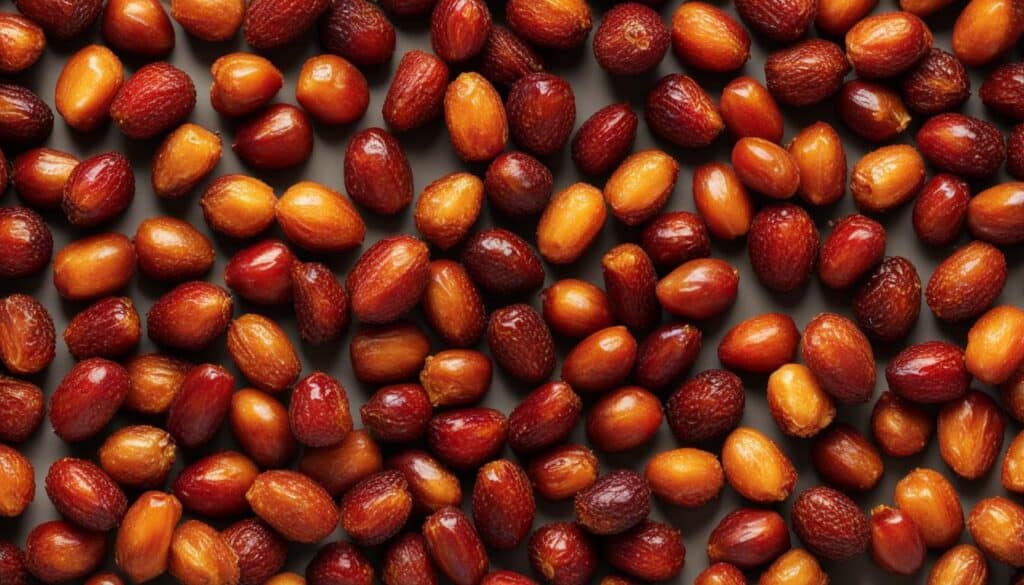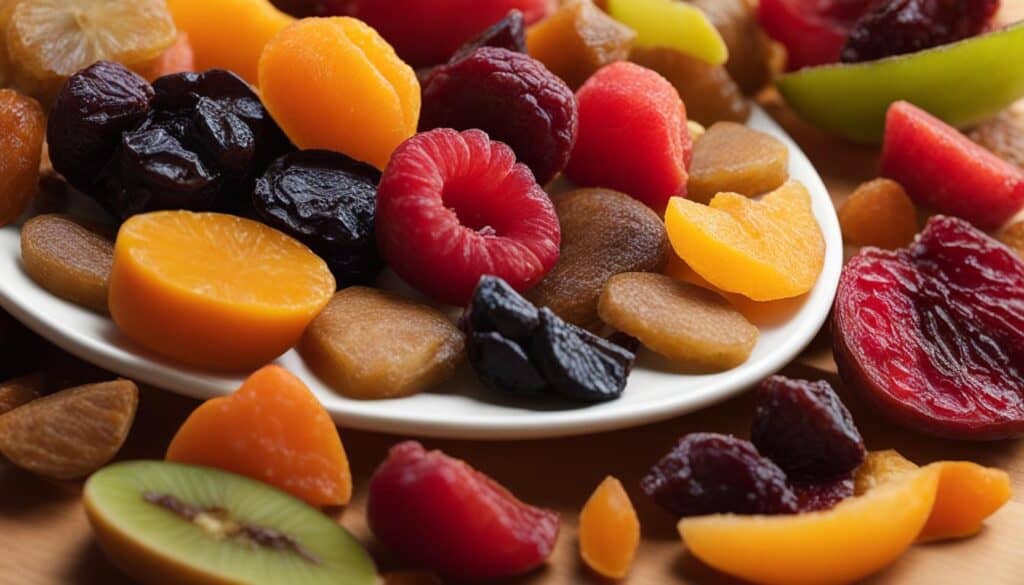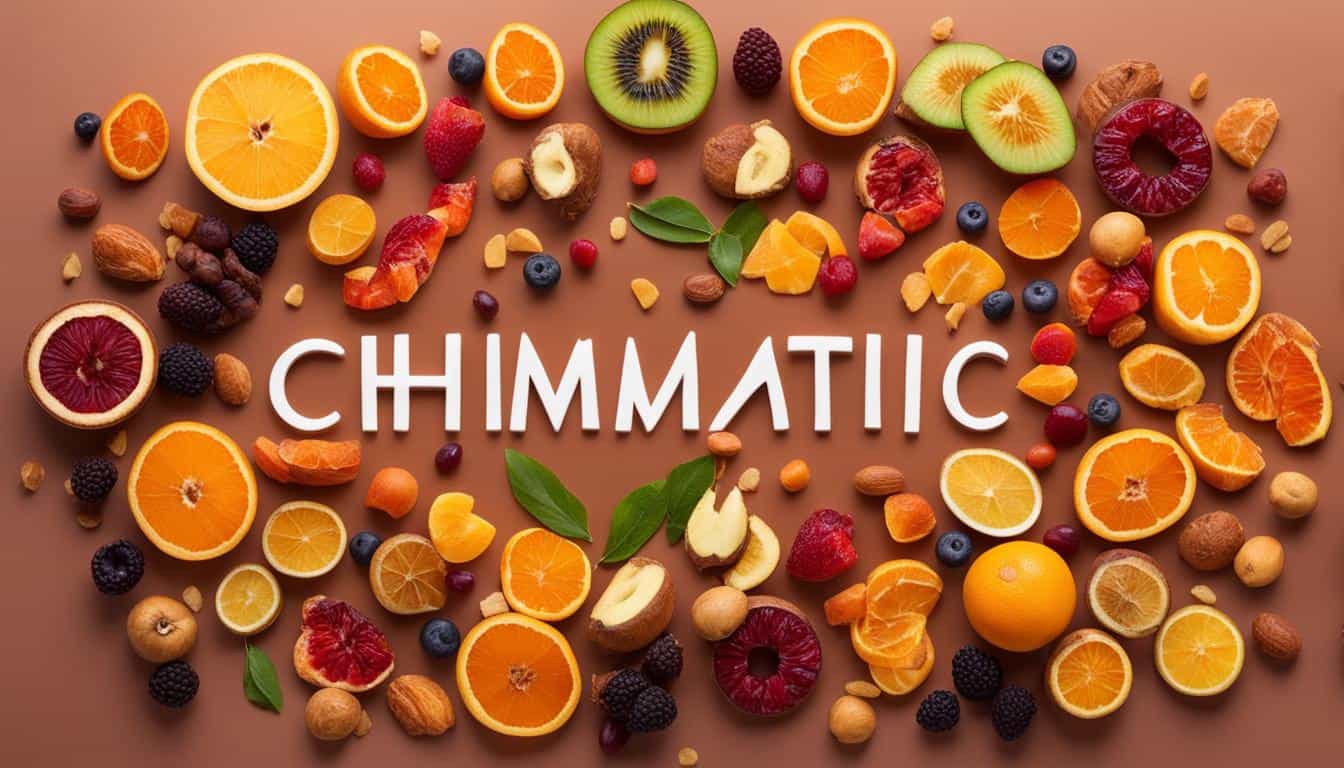Hello there, I’m excited to share my top picks for the healthiest dried fruits with you! Dried fruits are not only convenient but also packed with nutrition. While they may have a higher calorie content compared to fresh fruit, they offer essential minerals, vitamins, phytonutrients, and fiber.
When choosing dried fruits, it’s crucial to read the packaging labels and opt for varieties without added sugar or sulfur dioxide. This ensures that you are getting the most out of your dried fruit without any unnecessary additives. Now, let’s dive into my top choices for the healthiest dried fruits:
Key Takeaways:
- Dried fruits are rich in minerals, vitamins, phytonutrients, and fiber.
- Choose dried fruits without added sugar or sulfur dioxide.
- The healthiest dried fruits include peaches, apples, lychees, apricots, prunes, figs, cranberries, currants, raisins, pears, tomatoes, and jujube.
- Incorporating a variety of dried fruits into your diet can enhance overall wellness and support a healthy lifestyle.
- Enjoy dried fruits as a convenient and nutritious snack option.
What Are Dried Fruits?
Dried fruits are an excellent and versatile addition to any diet. But what exactly are dried fruits? Let’s dive into the definition, process of drying fruits, and the difference between fresh and dried fruit.
Dried fruits are fruits that have had most of their moisture removed either naturally or through the use of heat. This process makes dried fruits denser and higher in certain nutrients and fiber compared to fresh fruit. The removal of water intensifies the flavors and concentrates the natural sugars, resulting in a deliciously sweet and nutritious snack.
The process of drying fruits involves various methods, such as sun drying, air drying, or using dehydrators or ovens. In each method, the fruit is exposed to low heat, allowing the moisture to evaporate slowly over time. This drying process preserves the fruits by inhibiting the growth of bacteria, mold, and yeast, ensuring their long shelf life and making them convenient for storage and consumption.
The difference between fresh and dried fruit lies in their texture, taste, and nutritional composition. Fresh fruit is juicy and crisp, containing a high proportion of water, while dried fruit is chewy, dense, and concentrated in flavor. While fresh fruit often retains more vitamins and minerals, dried fruit can be a rich source of nutrients, fiber, and antioxidants due to the decreased water content. However, it’s worth noting that some heat-sensitive vitamins, such as vitamin C, may be partly lost during the drying process.
Now that we have a good understanding of what dried fruits are, let’s explore their numerous health benefits and learn about the specific types of dried fruits and their unique nutritional profiles.
Benefits of Eating Dried Fruit
Eating dried fruit provides a multitude of benefits for your health and well-being. Whether you’re looking for a nutritious snack or a tasty addition to your meals, dried fruit is a fantastic choice. Let’s explore some of the reasons why incorporating dried fruit into your diet can be beneficial.
Vitamins, Minerals, and Antioxidants
Dried fruits are rich in nutrients, vitamins, minerals, and antioxidants. They contain a wide range of essential vitamins and minerals, including vitamin C, vitamin K, potassium, and iron. These nutrients play a vital role in supporting various bodily functions, such as immune system health, bone strength, and energy production.
Dietary Fiber for Digestion and Blood Sugar Regulation
Dried fruits are an excellent source of dietary fiber, which is essential for maintaining a healthy digestive system. Fiber aids in proper digestion, prevents constipation, and promotes regular bowel movements. Additionally, the fiber in dried fruit helps regulate blood sugar levels, making it a suitable choice for individuals with diabetes or those looking to manage their blood sugar levels effectively.
Convenience and Portability
One of the significant advantages of dried fruit is its convenience and portability. Whether you’re on the go, at work, or traveling, dried fruit is easy to carry and requires no refrigeration. It’s a quick and nutritious option that can help curb cravings and keep you energized throughout the day.
A Healthier Alternative
Dried fruit can be a healthier alternative to baked desserts or processed snacks. Instead of reaching for sugary treats or unhealthy snacks, opt for dried fruit. It provides natural sweetness without the added sugars and unhealthy fats found in many other snack options. Incorporating dried fruit into your diet can help you make healthier choices and improve your overall wellness.
Reducing the Risk of Chronic Diseases
Research suggests that consuming dried fruit may reduce the risk of chronic diseases, such as heart disease and certain types of cancer. The antioxidants present in dried fruit help fight oxidative stress and inflammation in the body, which are key factors in the development of these diseases. By including dried fruit in your diet, you can potentially improve your long-term health outcomes.
To summarize, dried fruit offers numerous health benefits, including rich nutrient content, dietary fiber for digestion and blood sugar regulation, convenience, and potential protection against chronic diseases. Its natural sweetness and portability make it an ideal choice for a healthy snack or addition to various dishes.
| Type of Benefit | Advantages of Eating Dried Fruit |
|---|---|
| Vitamins, Minerals, and Antioxidants | Rich source of essential nutrients and antioxidants |
| Dietary Fiber | Aids digestion and regulates blood sugar levels |
| Convenience and Portability | Easy to carry and doesn’t require refrigeration |
| Healthier Alternative | Provides natural sweetness without added sugars and unhealthy fats |
| Reducing the Risk of Chronic Diseases | May help protect against heart disease and certain types of cancer |
Takeaway
By incorporating a variety of dried fruits into your diet, you can enjoy their many benefits and improve your overall health. Whether you snack on them straight from the package or use them in cooking and baking, dried fruits offer a convenient and nutritious way to enhance your well-being.
Types of Dried Fruits & Their Nutrients
Dried fruits come in a variety of types, each offering its own unique combination of nutrients. Some of the popular dried fruits include apricots, apples, peaches, lychees, prunes, figs, cranberries, currants, raisins, pears, tomatoes, and jujube. Let’s take a closer look at the nutritional content of these flavorful fruits.
Apricots:
Apricots are a rich source of vitamin A, which supports eye health and boosts the immune system. They also contain iron, an essential mineral for red blood cell production.
Raisins:
Raisins are known for their mineral content, particularly potassium and manganese. Potassium plays a vital role in maintaining proper heart function, while manganese supports bone health.
Prunes:
Prunes, which are dried plums, are a great source of dietary fiber. They assist in maintaining a healthy digestive system and preventing constipation. Prunes also contain potassium and vitamin K, which support bone health.
Cranberries:
Cranberries are well-known for their antioxidant properties. They contain vitamins C and E, which help protect against cell damage caused by free radicals.
Apples:
Apples are an excellent source of dietary fiber, aiding in digestion and promoting a feeling of fullness. They also contain vitamins C and B-complex, as well as antioxidants.
| Dried Fruit | Vitamins | Minerals | Fiber (per 100g) |
|---|---|---|---|
| Apricots | Vitamin A | Iron | 3.9g |
| Raisins | Potassium, Manganese | 3.7g | |
| Prunes | Potassium, Vitamin K | 7.1g | |
| Cranberries | Vitamin C, Vitamin E | 11.6g | |
| Apples | Vitamin C, B-complex | 2.4g |
As you can see from the table above, dried fruits offer a diverse range of vitamins, minerals, and fiber. Incorporating these tasty treats into your diet can provide numerous health benefits and contribute to overall well-being.
Dried Apricots & Their Health Benefits
Dried apricots are a delicious and nutritious option that offers a range of health benefits. These dried fruits are packed with essential nutrients that can support your overall well-being.
One of the key health benefits of dried apricots is their high vitamin A content. Vitamin A is crucial for maintaining healthy vision and promoting a strong immune system. By including dried apricots in your diet, you can provide your body with the necessary vitamin A for optimal eye health and immune function.
In addition to vitamin A, dried apricots are also a rich source of iron. Iron plays a vital role in the production of red blood cells, which are responsible for carrying oxygen throughout the body. Incorporating dried apricots into your meals or snacks can help ensure you maintain healthy iron levels, supporting proper blood cell formation.
Dried apricots are also an excellent source of dietary fiber. Fiber is essential for promoting healthy digestion and regulating bowel movements. By including dried apricots in your diet, you can increase your fiber intake, supporting a healthy digestive system and preventing constipation.

| Nutrient | Amount per Serving (100g) |
|---|---|
| Calories | 241 |
| Protein | 3.4g |
| Fat | 0.5g |
| Carbohydrates | 63.9g |
| Dietary Fiber | 9.7g |
| Vitamin A | 3,446 IU |
| Iron | 4.4mg |
With their natural sweetness, dried apricots can also be a great alternative to sugary snacks or desserts. Including them in your diet can satisfy your sugar cravings while providing your body with valuable nutrients.
Incorporating dried apricots into your culinary repertoire is easy. You can enjoy them as a standalone snack, add them to trail mixes or granola, or use them as a delightful addition to both sweet and savory recipes.
Overall, dried apricots are a wholesome and tasty choice that can contribute to your overall health and well-being. Their high vitamin A content, iron, and dietary fiber make them a great addition to a balanced diet.
Dates & Their Health Benefits
Dates are a sweet and nutritious dried fruit with several health benefits. They are rich in fiber, which can aid in digestion and prevent constipation. Dates also contain essential minerals like potassium and magnesium, which are important for energy production and muscle function. They are a natural source of sweetness and can be enjoyed as a healthier alternative to sugary snacks or desserts.

One of the key health benefits of dates is their high fiber content. Fiber plays a crucial role in maintaining a healthy digestive system. It helps promote regular bowel movements, prevent constipation, and support overall gut health. Regular consumption of dates can help alleviate digestive issues and improve digestion.
In addition to fiber, dates are packed with essential minerals. Potassium, for instance, helps balance electrolytes in the body and supports proper muscle function. It also plays a vital role in maintaining a healthy heart. Magnesium, on the other hand, is involved in more than 300 enzymatic reactions in the body, including energy production, muscle relaxation, and nerve function. Including dates in your diet can contribute to optimal energy levels and overall well-being.
Furthermore, dates are a natural source of sweetness and can be a healthier choice for satisfying sweet cravings. They provide a delicious and nutritious alternative to processed sugar. Dates offer a variety of nutrients and antioxidants, making them a great addition to a balanced diet.
Health Benefits of Dates:
- Aids in digestion and prevents constipation
- Rich in fiber for a healthy digestive system
- Contains essential minerals like potassium and magnesium
- Provides natural sweetness as a healthier alternative to sugary snacks
“Dates are a sweet and nutritious dried fruit with a host of health benefits. Their fiber content supports digestion, while essential minerals contribute to energy and muscle function. Enjoy dates as a delicious and healthier way to satisfy your sweet cravings.”
Prunes & Their Health Benefits
Prunes, also known as dried plums, offer a plethora of health benefits. These sweet and chewy fruits are not only delicious but also packed with essential nutrients that can support overall wellness.
One of the standout features of prunes is their high fiber content. A single serving of prunes can provide up to 12% of the recommended daily intake of fiber. This dietary fiber is crucial for maintaining a healthy digestive system and preventing constipation. Regular consumption of prunes can help promote bowel regularity and support optimal digestive health.
In addition to fiber, prunes are rich in several other essential nutrients. They are particularly high in potassium, a mineral necessary for maintaining healthy blood pressure levels and supporting proper heart function. Prunes are also a good source of vitamin K, which is essential for bone health and plays a role in blood clotting.
Adding prunes to your diet can contribute to a well-balanced and nutritious eating plan. These versatile dried fruits can be enjoyed on their own as a snack or incorporated into a variety of dishes, such as granola, baked goods, or even savory recipes.
“Prunes are nature’s digestive remedy, packed with fiber and essential nutrients.” – Certified Nutritionist Sarah Johnson
When incorporating prunes into your diet, it’s essential to opt for varieties without added sugar or preservatives. Check the packaging labels to ensure you’re getting the most nutritional benefits from your prunes.
To further illustrate the nutritional value of prunes, take a look at the table below:
| Nutrient | Amount per 1/2 cup (85g) |
|---|---|
| Calories | 208 |
| Fiber | 6 grams |
| Potassium | 637 mg |
| Vitamin K | 59 mcg |
As you can see, prunes are a nutrient-dense food that can be a valuable addition to your diet. Their high fiber content, along with the presence of potassium and vitamin K, can provide numerous health benefits and promote overall well-being.
So next time you’re looking for a snack that combines taste and nutrition, reach for a handful of prunes and enjoy the goodness they have to offer.

Raisins & Their Health Benefits
Raisins are dried grapes that offer several health benefits. They are rich in antioxidants, which can help protect against oxidative stress and inflammation. Raisins also contain fiber and natural sugars, making them a healthier choice for satisfying sweet cravings. They have been associated with reducing the risk of heart disease and supporting blood sugar control. Adding raisins to your diet can provide a range of nutrients and contribute to overall well-being.

Antioxidants in Raisins
Raisins are packed with antioxidants, which are compounds that help fight free radicals and reduce inflammation in the body. The antioxidants in raisins, such as polyphenols and flavonoids, have been shown to have numerous health benefits. They can help protect against chronic diseases like heart disease and cancer.
Nutrients in Raisins
Raisins are a good source of several essential nutrients. They contain vitamins and minerals like vitamin C, potassium, and iron. These nutrients are important for maintaining a healthy immune system, supporting proper muscle function, and aiding in the production of red blood cells.
Raisins for Heart Health
Including raisins in your diet can be beneficial for heart health. The antioxidants in raisins help reduce inflammation and prevent the oxidation of cholesterol, which can lead to heart disease. The fiber in raisins can also help lower cholesterol levels and regulate blood pressure.
Raisins for Blood Sugar Control
Raisins can be a helpful addition to a balanced diet for people with diabetes or those looking to manage their blood sugar levels. Despite their natural sugars, raisins have a low glycemic index, which means they don’t cause a rapid spike in blood sugar levels. The fiber in raisins also helps slow down the absorption of sugar into the bloodstream, promoting better blood sugar control.
| Health Benefits of Raisins | Nutrients in Raisins | Antioxidants in Raisins | Raisins for Heart Health | Raisins for Blood Sugar Control |
|---|---|---|---|---|
| Rich in antioxidants, reducing the risk of chronic diseases | Contain vitamins and minerals like vitamin C, potassium, and iron | Packed with polyphenols and flavonoids | Help reduce inflammation, prevent oxidation of cholesterol | Low glycemic index, promote better blood sugar control |
Healthiest Dried Fruit for Weight Loss
When it comes to weight loss, choosing the right dried fruits can make a difference. Opting for low-calorie options that are high in fiber can promote feelings of fullness and help reduce calorie intake. Incorporating these healthy dried fruits into your weight loss journey can provide essential nutrients while keeping your calorie count in check.
Low-Calorie Dried Fruits
If you’re looking to shed some pounds, consider adding these low-calorie dried fruits to your diet:
- Apricots: With only about 48 calories per serving, apricots are not only low in calories but also packed with vitamins A and C.
- Apples: A medium-sized dried apple contains just around 80 calories and offers dietary fiber to aid in digestion.
- Pears: Similar to apples, dried pears are a low-calorie option, providing fiber and essential vitamins and minerals.
- Cranberries: These tart berries are rich in antioxidants and fiber, offering a mere 46 calories per serving.
By incorporating these low-calorie dried fruits into your meals or enjoying them as a snack, you can satisfy your cravings while maintaining a calorie deficit.
High-Fiber Dried Fruits
Fiber plays a crucial role in weight loss as it helps control appetite and enhances satiety. Including these high-fiber dried fruits in your diet can keep you feeling fuller for longer:
- Apricots: Apart from being low in calories, dried apricots are an excellent source of dietary fiber.
- Apples: Choose dried apples with the skin intact as it contains most of the fiber content.
- Pears: Dried pears are not only low in calories but also high in fiber, making them an ideal choice for weight loss.
- Cranberries: These berries are rich in fiber, helping you stay satisfied and curb unnecessary snacking.
By opting for high-fiber dried fruits, you can support your weight loss goals while promoting healthy digestion and satiety.
Remember to practice portion control and enjoy dried fruits as part of a balanced diet. While they offer numerous health benefits, moderation is key to ensure you stay within your daily calorie limit.

*Please note that the image displayed above is solely for visual representation and may not directly correspond to the content of this section.
Best Dried Fruit For Diabetics
Dried fruits can be a part of a diabetic-friendly diet, but it’s important to choose low-sugar options. Look for dried fruits that have a lower glycemic index and consume them in moderation.
Some of the best dried fruits for diabetics include:
- Apricots
- Apples
- Berries
- Cherries
These fruits have a lower sugar content and can be enjoyed as a snack or added to meals in controlled portions.
The Best Dried Fruit Choices for Diabetics
| Dried Fruit | Sugar Content (per cup) | Glycemic Index |
|---|---|---|
| Apricots | 4g | 34 |
| Apples | 24g | 38 |
| Berries | 4-7g | 25-40 |
| Cherries | 18g | 22 |
Conclusion
In conclusion, dried fruits are a fantastic choice for a convenient and nutritious snack. They provide essential nutrients, fiber, and antioxidants that contribute to overall wellness and support a healthy lifestyle. Some of the healthiest dried fruits to include in your diet are peaches, apples, apricots, prunes, raisins, and cranberries. These fruits offer a wide range of health benefits, ensuring you get a variety of essential vitamins and minerals.
When incorporating dried fruits into your diet, it’s crucial to select options without added sugar or other additives. Reading packaging labels carefully will help you find the healthiest dried fruit choices. Enjoying dried fruits as part of a well-balanced diet can enhance your overall wellness and provide a healthier alternative to processed snacks or desserts.
So, next time you’re looking for a convenient and nutritious snack, reach for dried fruits such as peaches, apples, apricots, prunes, raisins, or cranberries. By incorporating these health-packed choices into your diet, you can enjoy their delicious taste while reaping the numerous benefits they offer for your well-being.
FAQ
Which dried fruit is the healthiest?
Some of the healthiest dried fruits include peaches, apples, lychees, apricots, prunes, figs, cranberries, currants, raisins, pears, tomatoes, and jujube.
What are the health benefits of dried fruit?
Dried fruits are rich in nutrients, vitamins, minerals, and antioxidants. They are also a good source of dietary fiber, which can help improve digestion and regulate blood sugar levels. They have been associated with reducing the risk of chronic diseases such as heart disease and cancer.
What is the nutritional value of dried fruit?
Dried fruits are higher in certain nutrients and fiber compared to fresh fruit. They provide essential minerals, vitamins, phytonutrients, and fiber. However, some vitamins may be lost during the drying process.
What are the benefits of eating dried fruits?
Eating dried fruits can provide essential nutrients, fiber, and antioxidants. They are convenient, portable, and can be a healthier alternative to baked desserts or processed snacks.
Which dried fruits are the best for health?
Some of the healthiest dried fruits include peaches, apples, apricots, prunes, raisins, and cranberries. These fruits offer a range of health benefits and can be enjoyed as part of a well-balanced diet.
How can dried fruits contribute to wellness?
Dried fruits offer a variety of nutrients, fiber, and antioxidants that support overall wellness. They can provide essential vitamins and minerals, improve digestion, regulate blood sugar levels, and reduce the risk of chronic diseases.
What are the healthiest types of dried fruit?
Some of the healthiest types of dried fruit include peaches, apples, apricots, prunes, raisins, and cranberries. These fruits offer a range of vitamins, minerals, and fiber that contribute to overall health.
How can I rank dried fruits by healthiness?
Dried fruits can be ranked by considering their nutrient content, fiber content, and overall health benefits. Some factors to consider when ranking dried fruits include their vitamin and mineral content, antioxidant levels, and impact on digestion and blood sugar levels.
How do I choose the healthiest dried fruit?
When choosing dried fruit, it’s important to read the packaging labels and choose options without added sugar or sulfur dioxide. Look for fruits that are naturally dried and do not have any additional additives. Consider the nutrient content and overall health benefits of the fruit.





Leave a Reply